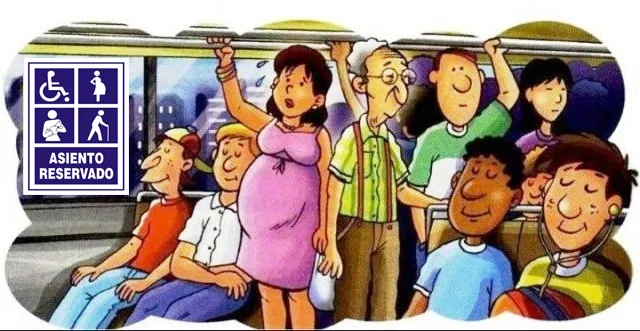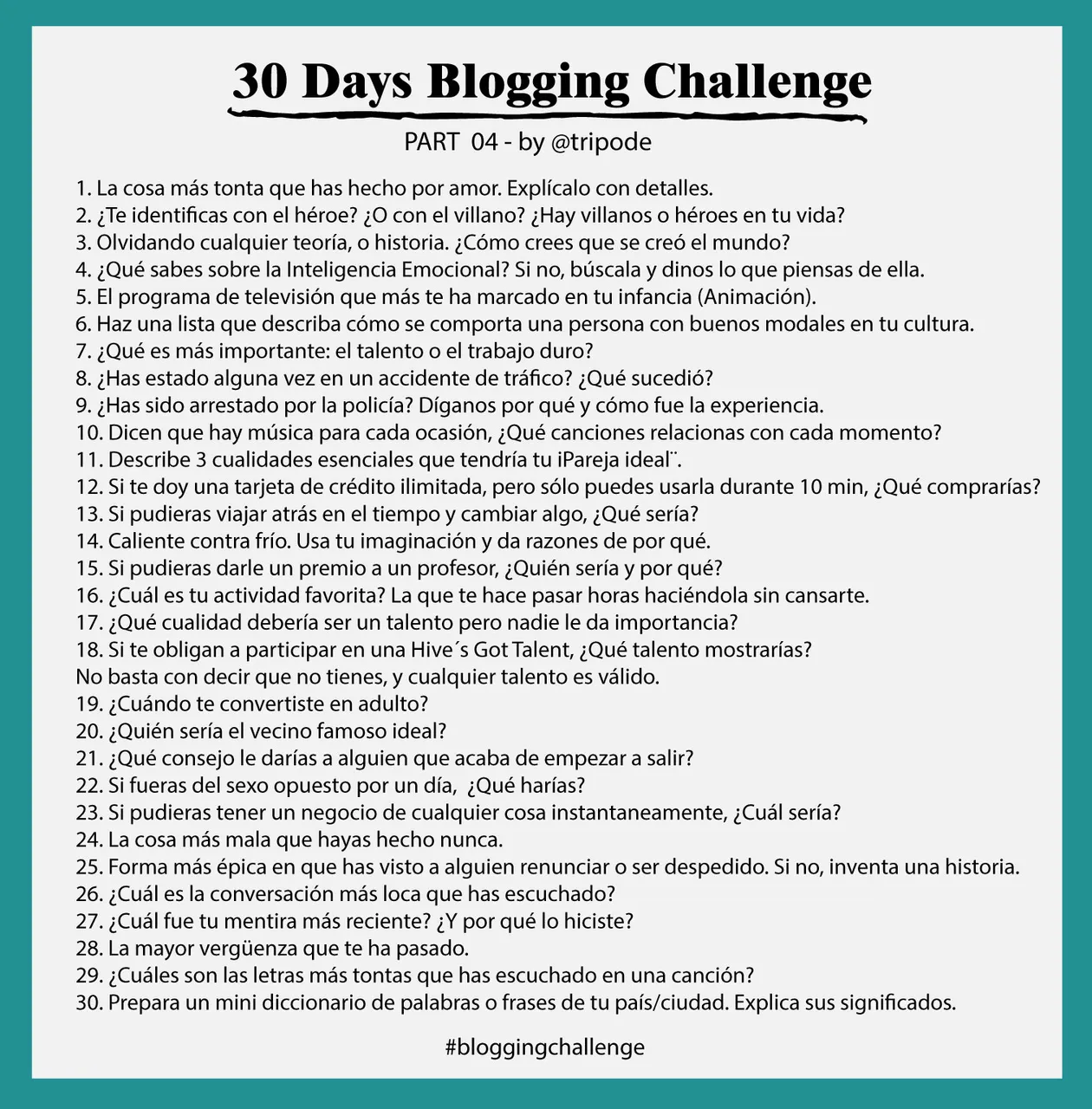

Hola mis Hiver's, hoy es mi sexto día en la cuarta parte del #BloggingChallege, esta vez me corresponde la pregunta 6, y el tema a tratar es "Haz una lista que describa como se comporta una persona con buenos modales en tu cultura".
Hello my Hiver's, today is my sixth day in the fourth part of #BloggingChallege, this time I'm up for question 6, and the topic to cover is "Make a list describing how a person with good manners behaves in your culture".

Desde muy pequeños en nuestras casas nos enseñan buenos modales, buenas conductas para ser unas personas agradables y educadas es lo primordial en la casa de los padres, cero groserías, no coloques los codos en la mesa, hablé de usted, siéntate bien, no grites, pide permiso, da las gracias, saluda, respeta,son las cosas que le escuchamos decir a nuestros padres, hasta que nos marchamos de su casa.
From a very young age in our homes we are taught good manners, good behavior to be a nice and polite people is paramount in the house of the parents, zero rudeness, do not put your elbows on the table, speak of you, sit well, do not shout, ask permission, say thank you, greet, respect, are the things we hear our parents say, until we leave home.


El comportamiento de una persona deja mucho que pensar, sobre su educación, por eso es muy importante comportarse en la calle y en el hogar, dar buenos ejemplos de comportamiento y de educación, para tener hijos que sean respetuosos.
The behavior of a person leaves much to think about, about their education, so it is very important to behave in the street and at home, to give good examples of behavior and education, to have children who are respectful.

- Decir por favor para pedir algo.
- Dar gracias por las cosas.
- Dar prioridad a quien lo merece ejemplo, ceder el puesto a una embarazada en un transporte publico
- Saber decir las cosas si pelear.
- No burlarse de las otras personas.
- Ser cortes.
- Tocar las puertas antes de entrar.
- Pedir disculpas, cuando te equivoques.
- Respetar a las personas mayores.
- Respetar los semáforos y señales.
- No tirar basura.
- Respetar a las personas desconocidas.
- No usar sobre-nombres si no sabes cómo es su nombre, debes referirte como señora o señor.
- Comer de manera educada.
- Saying please to ask for something.
- Giving thanks for things.
- Giving priority to those who deserve it, e.g., giving a seat to a pregnant woman on public transportation.
- Know how to say things without fighting.
- Do not make fun of other people.
- Be polite.
- Knock on doors before entering.
- Apologize when you make a mistake.
- Respect older people.
- Respect traffic lights and signs.
- Do not litter.
- Respect people you don't know.
- Don't use over-names if you don't know what their name is, you should refer to them as "ma'am" or "sir.
- Eat politely.



Estás son algunos modelos que aún algunas personas mantienen viva, la verdad, en este aspecto se que un porcentaje grande de por lo menos mi región está falta de buenos modales y no por que los padres fallaran en educarlos bien, si no por que los hijos no tomaron esos ejemplos.
These are some models that some people still keep alive, the truth, in this aspect I know that a large percentage of at least my region is lacking in good manners and not because the parents failed to educate them well, but because the children did not take those examples.
Ejemplo del día a día para mí: es muy desagradable tomar el bus porqué apenas me subo doy los buenos días, nadie contesta, si se monta una persona de la tercera edad todo el mundo voltea la cara para no ceder el asiento, lo mismo ocurre con una persona embarazada, el colector en vez de decir señorita cancele el pasaje, usan frases como "gordita, la de la franela verde, ¿pagame!", El chófer se le atraviesa a todos los carros, llegas a alguna parada y no te dice, te empujan y te dicen te quitáis o te llevo.
For me it is very unpleasant to take the bus because as soon as I get on I say good morning, nobody answers, if a senior citizen gets on the bus everyone turns their face away to not give up the seat, the same happens with a pregnant person, the collector instead of saying "Miss, cancel the ticket", they use phrases like "fatty", the one with the green flannel, pay me! "The driver gets in the way of all the cars, you arrive at a stop and he doesn't tell you, they push you and tell you to get off or I'll take you away.


De verdad yo sufro mucho cuando me toca ir en el metro o en un bus, quisiera que las personas vivieran diferente, para mi es un malestar social, vivir entre tanta indiferencia, nadie respeta nada, ni siquiera la naturaleza porque quién puede tira la basura en el piso lo hace, por eso digo que una gran minoría utiliza los buenos modales, espero que quizás leyendo este post algunos tomemos consciencia, porque somos personas que necesitan afecto social, no todo son las redes sociales, tenemos una vida de verdad la cual no valoramos, es bastante importante los modales, la educación, los valores, necesitamos adoptar nuevas culturas o desarrollar una propia con un cambio grande, quizás así y solo así todo en Venezuela pueda mejorar.
I really suffer a lot when I have to go on the subway or on a bus, I wish people lived differently, for me it is a social malaise, to live among so much indifference, nobody respects anything, not even nature because who can throw garbage on the floor does it, that's why I say that a large minority uses good manners, I hope that maybe by reading this post some of us will become aware, because we are people who need social affection, not everything is social networks, we have a real life which we do not value, it is very important manners, education, values, we need to adopt new cultures or develop our own with a big change, maybe this way and only this way everything in Venezuela can improve.

Muchas gracias por tomar unos minutos de tu valioso tiempo para leer mi post, recuerda que la educación entra por casa, debemos ser consientes y preparar a nuestros hijos como buenas personas en todos los ámbitos de la vida.
Thank you very much for taking a few minutes of your valuable time to read my post, remember that education starts at home, we must be aware and prepare our children as good people in all areas of life.





La imagen del banner fue editada con la aplicación Photoshop CS6| The image of the banner was edited with the Photoshop CS6 application
Las imagenes del divisor, 30 dias y Blogging Challenge, fueron tomadas de la comunidad BC | The images of the divisor, 30 days and Blogging Challenge, were taken from the community BC
Traducido con www.DeepL.com | Translated with www.DeepL.com/Translator



